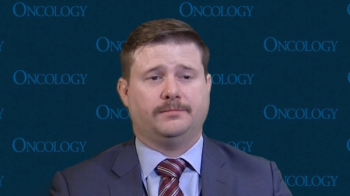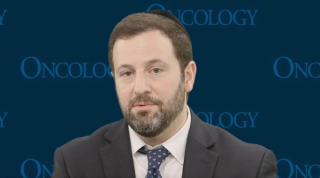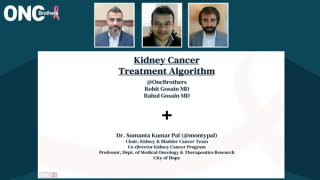
Kidney Cancer
Latest News
Latest Videos

CME Content
More News

A patient's perspective on managing the side effects of treatment for advanced RCC.

Dr. Hutson explains approaches to educating patients on potential side effects of immunotherapy combinations for kidney cancer, empowering them to manage side effects and maintain quality of life while getting clinical benefit from these life-extending therapies.

Kidney cancer, which once had few treatment options, now has multiple oral targeted therapies leading to improved survival; immunotherapy combinations further increased clinical benefit over previous options, providing clinicians several approved regimens from which to choose the optimal therapy for each patient.

Results from the phase 3 LITESPARK-005 trial led to the approval of belzutifan for patients with advanced renal cell carcinoma, according to the FDA.

Mr. Fuentes felt it was important to understand the range of potential side effects to anticipate how his body would potentially react to treatment for RCC and determine his physical abilities and support needs, but was most focused on whether his first post-treatment scan showed tumor shrinkage.

Nurses play a key role in kidney cancer care by educating patients on medications, closely monitoring and managing side effects, coordinating care, providing emotional support, and serving as the first line of communication with patients about treatment concerns.

In closing, experts share clinical pearls on open communication with patients, dose reduction strategies, and the relevance of treatment holidays for improving quality of life in patients with renal cell carcinoma.

After his initial fear, Mr. Fuentes educated himself extensively on cancer to understand his diagnosis, which along with having a treatment plan in place, specialist referrals, and tolerable side effects, helps him maintain a positive mindset and manageable quality of life with stage 4 disease.

Mr. Cesar Fuentes had a kidney tumor surgically removed; lymph node and bone metastases years later led to immune and targeted therapy which have provided significant tumor shrinkage and generally mild, manageable side effects.

Surgery after neoadjuvant immune checkpoint inhibitor therapy for renal cell carcinoma is safe even in challenging surgical cases, according to Jason Scovell, MD.

In closing, experts share clinical pearls on open communication with patients, dose reduction strategies, and the relevance of treatment holidays for improving quality of life in patients with renal cell carcinoma.

Panelists discuss the dosing schedule and patient education related to tivozanib, along with indications for potential treatment switch based on toxicity management and patient well-being.

African American and Hispanic patients with clear cell renal cell carcinoma may be less likely to receive treatment with immune checkpoint inhibitors than White patients, says Solomon Woldu, MD.

Findings from a retrospective analysis indicate that treatment in non-academic cancer centers correlates with a decreased rate of immunotherapy use among patients with advanced clear cell renal cell carcinoma.

Surgery following treatment with checkpoint inhibitors yields no surgical complications in a cohort of patients with advanced renal cell carcinoma, according to Jason Scovell, MD, PhD.

Dr Thomas Hutson outlines the diagnosis and staging of renal cell carcinoma, the surgical and non-surgical treatment options, and notes that while the majority of cases are potentially curable, 20-25% of patients present with or later develop metastatic disease.

Thomas Hutson, DO, PharmD, discusses renal cell carcinoma, including its epidemiology, risk factors, subtypes, and management approaches, in a dialogue with his clinical nurse, Kacie Ellis, RN, and his patient, Mr. Cesar Fuentes.

Perspectives on the adverse events and management of tivozanib, covering common and serious toxicities with an emphasis on a multidisciplinary approach to optimize patient care and treatment benefits.

Experts from the Dana-Farber Cancer Institute delve into the TIVO-3 trial, discussing the design, outcomes, and nuances of tivozanib as a treatment option for refractory kidney cancer.

Expert insight into monitoring patients with advanced kidney cancer, covering the frequency of clinic visits, blood work, and CT scans, as well as signs and symptoms that might indicate disease progression.

Reviewing the case of a case of a 73-year-old man with metastatic clear cell kidney cancer, experts discuss second-line treatment options informed by prior treatment response, patient goals, and adverse event profiles.

Insight into the importance of patient-centered care, highlighting the role of a multidisciplinary team in managing advanced renal cell carcinoma and addressing questions regarding alternative medications.

Key opinion leaders reflect on treatment approaches for renal cell carcinoma in light of factors like risk classification, symptom severity, and patient preferences, with considerations ranging from active surveillance to systemic combination therapies.

Expert discussion focused on approved therapies for first-line kidney cancer treatment including combination therapies, immunotherapy, and tyrosine kinase inhibitors (TKIs) in various clinical scenarios.

Join Wenxin (Vincent) Xu, MD, and his team at Dana-Farber Cancer Institute as they explore strategies for diagnosing and stratifying renal cell carcinoma, reviewing a clinical scenarios and best practices in workup.












































